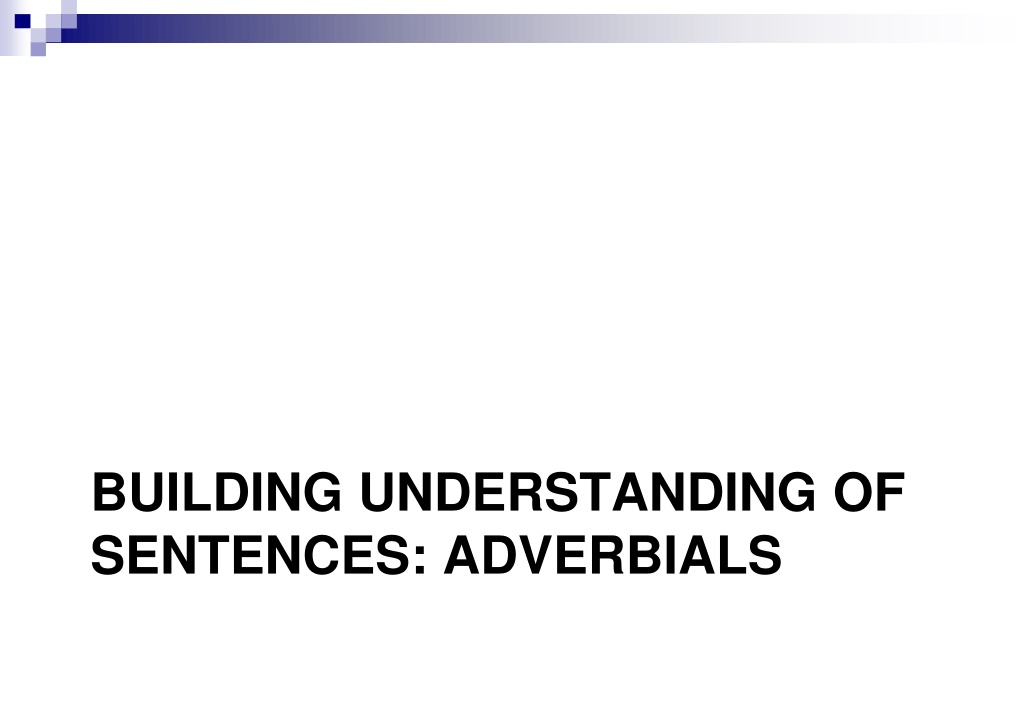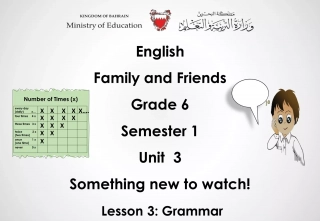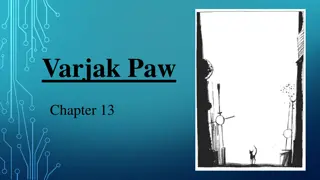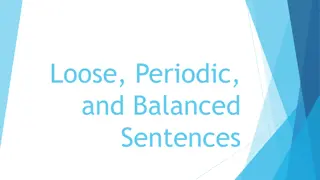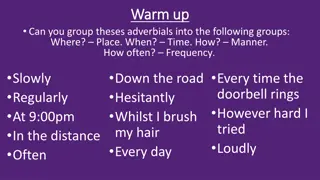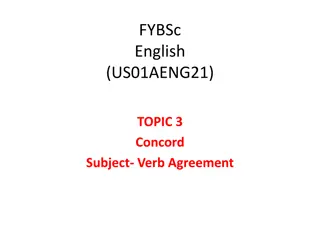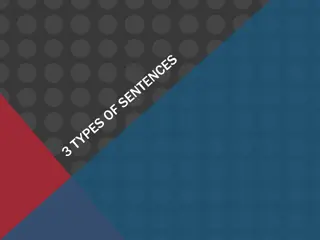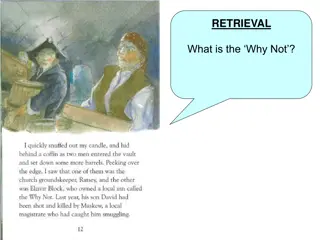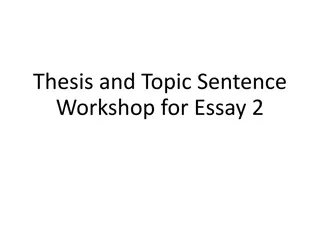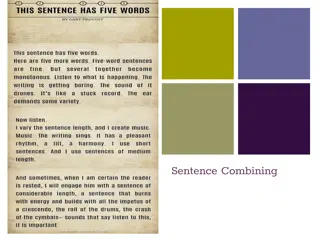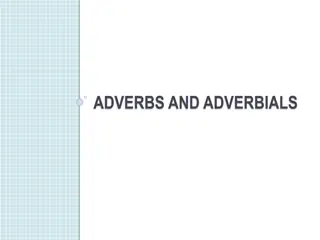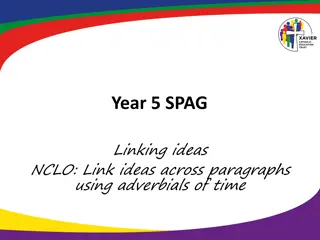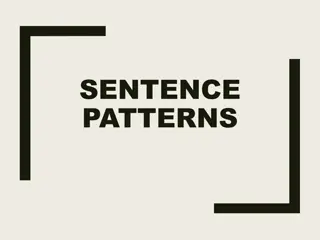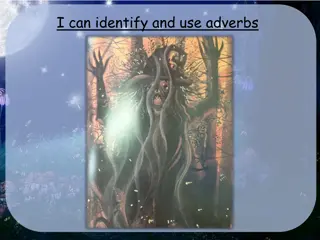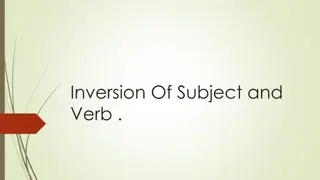Understanding Adverbials in Sentences
Adverbials play a crucial role in sentences by providing information about time, place, manner, reason, and degree. They can be single words, phrases, or clauses that modify verbs, adjectives, or other adverbs. Understanding the function of adverbials helps in analyzing sentence structure and improving writing skills across various text types.
Download Presentation

Please find below an Image/Link to download the presentation.
The content on the website is provided AS IS for your information and personal use only. It may not be sold, licensed, or shared on other websites without obtaining consent from the author. Download presentation by click this link. If you encounter any issues during the download, it is possible that the publisher has removed the file from their server.
E N D
Presentation Transcript
BUILDING UNDERSTANDING OF SENTENCES: ADVERBIALS
Adverbs/Adverbials Subject Verb Object Adverbial Complement (adjective) / Complement (noun) How would you describe the function of the adverbial slot in each sentence? Gregor ate bread greedily. Beauty s father was eating the extremely fresh bread. In the kitchen, Gregor ate bread so greedily. Gregor ate bread because he was hungry. Surprisingly, Beauty s father was eating the freshly baked bread .
Provide information about: Time - when Place - where Manner - how Reason - why Degree how much Adverbs/Adverbials Adverbials can be single words (adverbs), phrases or clauses. They modify (provide information about, or change our view of): Verbs ate greedily(but don t limit children s understanding to this) Adjectives extremely fresh Other adverbs so greedily A whole clause or sentence because he was hungry .Surprisingly, They are highly mobile within the sentence, and because of this they can affect how we think/feel this is how writers use them to position us as readers, e.g. in fictional narrative, to affect how we see a character s actions or a plot event; in non-fiction to provide detailed information about where/why/how things happen, or to emphasise the writer s opinion. They can link and sequence ideas across a whole text another reason why they are a powerful positioning tool.
Provide information about: Time - when Place - where Manner - how Reason - why Degree how much Adverbs/Adverbials Do we need both terms? Adverb is a type of word (a word class like noun, verb, preposition etc) Adverbialis a slot in a sentence, part of its structure We can say that an adverb functions as an adverbial but an adverbial is not necessarily an adverb Adverbials take different forms that have different functions within the sentence e.g. a noun phrase that tells us when something happened: Gregor ate bread last night a prepositional phrase that tells us where something happened: Gregor ate bread in the kitchen a subordinate clause that tells us why something happened: Gregor ate bread because he was hungry
Grammatical layering Children can be confused by the fact that something can be a prepositional phrase and an adverbial, or a subordinate clause and an adverbial. Try to focus on the fact that you identify a structure as adverbial by its function, looking at what it is doing to the rest of the sentence. If it is modifying a verb, adverb or adjective telling you how, when, where, why or how much something is happening then it is adverbial, regardless of what else it might also be.
Adverbials in campaign texts Beaten. Neglected. Starved. Will you help feed a dog like Archie until we can find him a home? When we found Archie, he weighed 3.2kg just half what he should have. Thankfully, he was brought to one of our rescue centres and has made a full recovery. But Archie is only one of over 120,000 animals rescued by the RSPCA each year. Please help us to help them. What meaning is lost if the adverbial is removed from the sentence? Look at the adverbials identified in the text. What is each one trying to do? How do they position the reader?
Identify the adverbials in this campaign text. What is each one trying to do? How do they position the reader? Primates as Pets We strongly believe that primates, as highly intelligent and complex wild animals, are not suitable pets. Similar to humans, they form intricate relationships and experience emotions, and some can even reflect on their past experiences and feelings. Sadly, thousands of primates, such as marmosets, capuchins and squirrel monkeys, are currently being confined inside UK homes. Taken too early Like humans, primates rely on their mothers, often until adulthood and beyond. Yet they can be torn from them at just a few weeks old to be hand-reared by humans, a distressful and cruel practice.
Identify the adverbials in this campaign text. What is each one trying to do? How do they position the reader? Primates as Pets We strongly believe that primates, as highly intelligent and complex wild animals, are not suitable pets. Similar to humans, they form intricate relationships and experience emotions, and some can even reflect on their past experiences and feelings. Sadly, thousands of primates, such as marmosets, capuchins and squirrel monkeys, are currently being confined inside UK homes. Taken too early Like humans, primates rely on their mothers, oftenuntil adulthood and beyond. Yet they can be torn from them at just a few weeks old to be hand-reared by humans, a distressful and cruel practice.
Making links between reading/writing and grammar For the Primates as Pets RSPCA text: Think of a specific teaching context in which you might use the text as a model what do you want it to show students about using adverbials in their writing? Devise a learning objective that makes a meaningful link between the grammar in the text and its effect. Hint: don t try to cover everything be as specific and explicit as possible by focusing on one clear feature and its purpose.
Resource from food Waste scheme Adverbs to show Point of View I'm passionate about making this happen because a few years ago I fell on hard luck myself. I lost my job through no fault of my own due to a chronic illness. My health would have improved immeasurably had I been able to afford fresh, healthy, fruit and vegetables. If a scheme whereby these life-giving items were available to me for free had been provided back then, I would have been spared the constant choice of eating properly or paying the ever-mounting bills. I was incredibly lucky that I had friends and family to bail me out and buy me a few groceries during the bleakest of times, but so many others are just not as fortunate. Now that I am well enough to support myself again, I don't want anyone else to experience the hell I went through. The food is THERE and it s perfectly good and nourishing. There are so many people who need it right now, despite what the government might try to make you believe. So what are we waiting for? France has already proven that this can work. So I m asking for Parliament to take this campaign seriously and rush through a change in the law as soon as possible, before anyone else in the UK starves needlessly.
Resource from food Waste scheme Adverbials to connect Ideas After reading about the bill being passed in France to force supermarkets to give their unsold but still consumable food products to at least one food charity I decided that I d try to do something for us here in the UK. For, while we may be separated by the Channel, our problems with waste are very much the same. For example, two years ago Tesco announced that it had generated almost 30,000 tonnes of food waste over just six months. In light of the successful French campaign to cut waste, I started a petition in the UK hoping that it may eventually make it to a debate in Parliament. I needed to get 100,000 signatures for this to happen. It's now got over 150,000, and has been popping up all over the world, across the press and social media. There are two main threads to my campaign. First of all, I believe that supermarkets should be legally obliged to hand over all unsold but still edible foods to various food distribution charities instead of it going straight to landfill. On top of this, supermarkets should also be encouraged to offer a service whereby customers can opt in for voluntary weekly donations (a small sum, around 2) when they buy their groceries online.
Resource from food Waste scheme Adverbials to Connect Ideas There are two main threads to my campaign. First of all, I believe that supermarkets should be legally obliged to hand over all unsold but still edible foods to various food distribution charities instead of it going straight to landfill. On top of this, supermarkets should also be encouraged to offer a service whereby customers can opt in for voluntary weekly donations (a small sum, around 2) when they buy their groceries online. In this paragraph the two adverbial phrases, First of all and On top of this , link back to the opening sentence and the two main threads . Thread 1 is introduced by First of all and thread 2 by On top of this . This helps to make the paragraph coherent and flow well. Have you noticed that this writer uses a short single clause sentence to introduce this paragraph?
Resource from food Waste scheme Adverbials to Connect Ideas Some examples of other adverbial phrases which can connect ideas across sentences and across your writing: on the other hand despite this even so to sum up in contrast as a result for instance You might know some more?
Resource from food Waste scheme Have your Say! Your chance to change the world! Make an argument expressing your opinion about food waste. Draft and rehearse to each other a 30 60 second soapbox speech (perhaps just four or five sentences), presenting your opinion on food waste, using positioning adverbs and some of the adverbial connectives to make it cohesive.
Building Learning Cumulatively Think about adverbs and adverbials: what might be a logical progression route for building learners understanding of adverbials and their function, from basic simple understanding to more complex understanding? Where would you start?
Building Learning Cumulatively Subordinate clauses as adverbials eg Although he was tired, he could not sleep. Noun phrases as adverbials eg last night; tomorrow morning Non-finite clauses as adverbials eg Slipping on the ice, he sank to the ground. Prepositional phrases as adverbials eg in the garden; as a result Sentence adverbs eg moreover; however; nevertheless The unexpected adverbs eg not; never; very; just; rather; almost Adverbs of reason eg; therefore; anyway Adverbs of place eg here; there; everywhere Adverbs of time eg yesterday; today; tomorrow Adverbs of manner eg sadly; fiercely; unfortunately; suddenly; possibly Some adverbs begin with -ly ?
